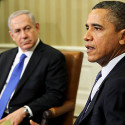Under the leadership of Prime Minister Benjamin Netanyahu, Israelis have realized the relationship between their country and the United States government has gone downhill. Though they don’t believe it has damaged their connection to American Jews, according to the Ruderman Family Poll.
The survey also indicates that most Israelis don’t blame their government for the deterioration they perceive between the two countries and believe Jerusalem works to strengthen Israel-U.S. ties, according to Haaretz.
The Ruderman Foundation regularly polls Israelis on the state of the relationship between Israel and the United States as part of its stated mission to “foster a more nuanced understanding of the American Jewish community” among Israelis and their leaders.
“I think what happens among Israelis is they see a separation between American Jews and the American government,” he said. “What Israelis are missing is that they just don’t understand how intimately connected American Jews are with the U.S. government and with American society. They often view the Jewish communities in places like France, Australia, and the U.S. as ghettos on their own, and that is just not the case … American Jews are influenced by – and, in turn influence – the American government and American society. This idea that Jews live in a ghetto as a subset 2of America is a misconception that Israelis have about American Jews and this is what’s born out in this poll.”
“The fact that most U.S. Jews see themselves as both Jewish and American and don’t separate between these identities is a bizarre concept to most Israelis.”
When asked, “To what extent do you feel U.S.-Israel relations have deteriorated over the last 5 years?” 34.9 percent said the relationship has gone downhill to a “very great” or “great” extent. An additional 45 percent said the ties between the countries have deteriorated to “some extent” or a “small extent.” A mere 18.9 said relations have not deteriorated at all and the same number said that they believe the deterioration in the relationship “affects the security of the state of Israel.
However, when asked “to what extent do you feel that this Israeli government” is working to sustain support of a “strong Israel” in Washington, 32 percent saying that that Israel was working to a very great or great extent, and more than 50 percent saying they were doing so to some or a small extent. 18.9 percent said they were not working to do so at all.
When asked “To what extent do you feel that deterioration of the relations between Israel and the U.S. affects relations between Israel and the American Jewish community?” A division was clear, with 50 percent answering either “to a small extent” or “not at all.” Only 26 percent said they believed that the relationship with U.S. Jews had been harmed to a very great or great extent.
The group polled, values ties and support from U.S. Jews. So when they were asked “to what extent should the Israeli government take into consideration American Jewish views regarding the U.S. Israel relationship,” 42 percent believed that the relationship to American Jewry should be considered to a very great or great extent. Whereas, 33 percent believed that it should be considered “to some extent.” Only 11 percent responded “not at all.”
Ruderman said he has witnessed the misperceptions that even sophisticated Israelis have regarding American Jews. Though he also said, “the Israeli public is very perceptive and they truly understand that the connection between American Jews and Israel as a being very important” and “they also understand that there is a growing divide between Israel and American Jews.”
Unfortunately due to their lack of comprehension of the mindset of U.S. Jews, they don’t understand the reasons for the growing division, especially with the younger generation, and don’t know how to improve the circumstances.

